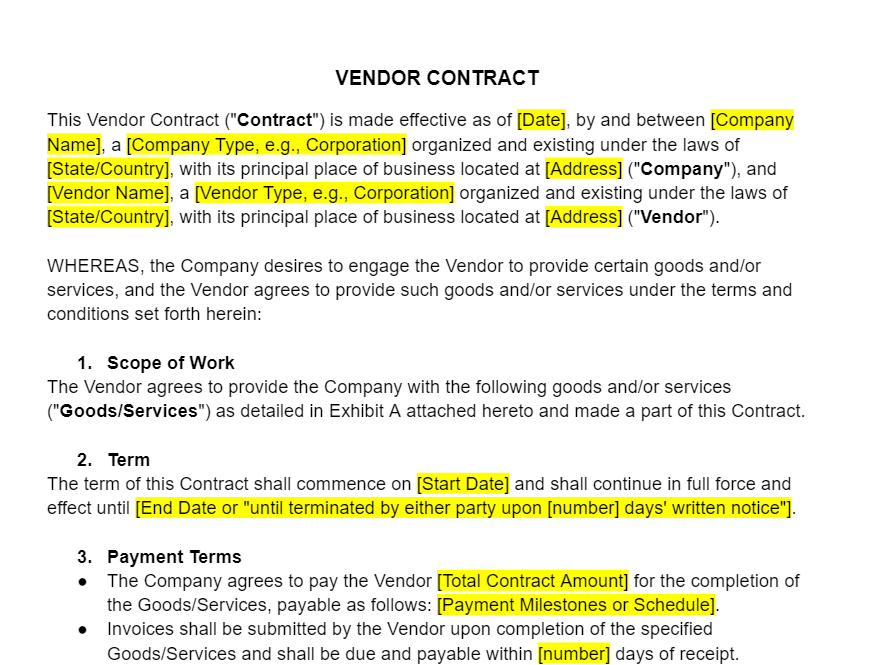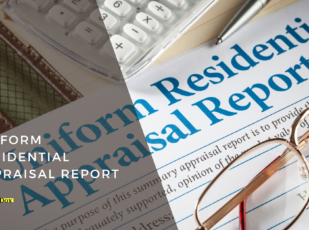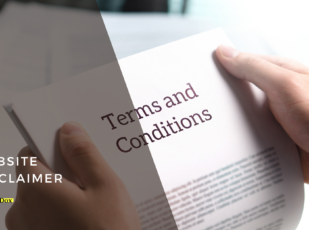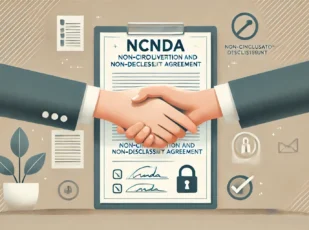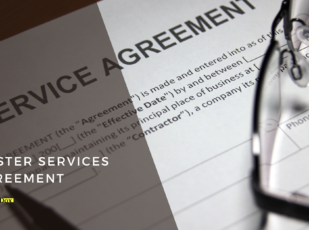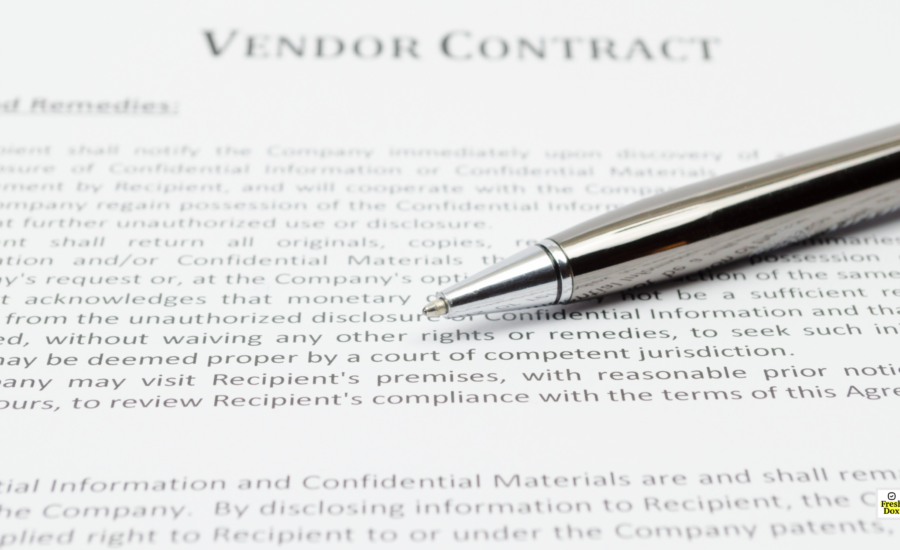
Vendor Contract Template
13 Downloads
Commercial, Money and Finances
February 17, 2025
Sayantani Dutta
Vendor agreements are crucial in facility management, helping to ensure operational efficiency and maintain the interests of an organization. These agreements bring clarity, a legal framework, and an understanding among all the parties involved.
Their many-faceted importance extends along a number of key areas.
Risk Management and Legal Protection: By defining the roles of each of the parties in question, the deliverables, and the conditions of the agreement, vendor contracts minimize potential risks and misunderstandings. They establish the governing laws and terms of agreement that can offer a basis for conflict resolution thus minimizing the contract breach or disputes over contract deliverables likely to occur. Clearly spelled-out indemnification clauses protect against unexpected liabilities.
Operational Continuity and Cost Predictability: A well-structured template guarantees continuity of services and clarity in the workflows, leading to better facility management. The pricing, payment schedules, and warranties stipulated in the agreement enable organizations to more accurately forecast their expenses, even in the most volatile markets. The payment terms often include addresses for issuing certified mail for notifications related to payment disputes or adjustments.
Legal and Business Protections: Vendor agreements not only cover legalities to the vendor relationship in a structured format but also guarantee the protection of proprietary information and intellectual property rights. These agreements include an agreement of limitation of liability and indemnity that saves both parties from incurring financial liability.
The Role of Vendor Agreements in Strengthening Vendor Relationships
A well-structured agreement with your vendors instills trust and teamwork. It outlines the role, responsibilities, and expectations and clears up the responsibilities and obligations of both parties. This transparency in the terms of the vendor agreement helps in reducing disputes, and provides provisions for termination clauses, confidentiality, and intellectual property rights to reinforce the relationship.
Understanding a Statement of Work (SoW)
A SoW is a component of the vendor agreement that outlines the scope and specifications of services to be carried out by the vendor. This document outlines the expectations, deliverables, and timelines.
For businesses dealing with freelancers, contractors, or vendors, an SoW is the basis for service contracts, making sure both parties are on the same page regarding the subject matter. Every organization, from small startups to large enterprises, depends on third-party vendors.
Whether utilizing a free template to keep things as simple as possible or an attorney to structure detailed legal documents, the SoW provides clarity to the relationship through the detailing of obligations between parties and offers protection against insolvency.
Types of Vendor Agreements
Agreements with vendors come in many forms and are tailored to suit particular business needs.
Some common types include:
Fixed Price Contracts: This fixes the costs of goods or services from the vendor to assist with maintaining price stability.
Time and Materials Contracts: These are the most common type of vendor agreement among independent contractors, where compensation is determined by the total hours spent at work and the cost of materials involved.
Distribution Agreements: The terms of the distribution of goods can be spelled out in this agreement, including conditions for exclusivity.
Indefinite Delivery Contracts: Flexible agreements allowing the delivery of unspecified quantities of goods or services.
Checklist for a Comprehensive Vendor Contract
When writing a vendor agreement, there are a few elements that must be included and elaborated upon for the benefit of both parties.
Vendor agreements, though not considered crucial when the business is in its early days of growth and expansion, are crucial in sustaining smooth flow and efficiency when the business stabilizes and matures. A well-defined vendor agreement brings clarity to the arrangement, minimizes risks, and provides the legal framework in the business relationship.
For these contracts to achieve their intended purpose, they need to feature information both specific and relevant in relation to the organization’s goals. An effective vendor agreement template needs to show or clearly highlight several critical elements when trying to form or put in place the basis for collaboration between parties.
Identifying the Parties
The names and contact information of the company and the vendor. This information includes the physical addresses and contact phone numbers or email addresses for future correspondence.
Clear Overview and Effective Date
Give a brief overview of the business relationship between the company and vendor and when the vendor contract officially starts.
Scope of Work
This is the section describing the vendor services, deliverables, or products they provide to the company. It helps to avoid disputes by setting clear expectations between parties as to the nature of the relationship and the obligations of the vendor to the company.
Price and Payment Terms
This section must be transparent with payment structures and include timelines and conditions for additional charges to protect both parties. Payment methods are specified, including the mention of delivery of notifications for overdue payments by certified mail.
Penalties
Clearly outline timelines and penalties for non-compliance.
Delivery and Timeline
Schedules for the delivery or completion of services ensure continuity of operations and facilitate smooth workflow.
Quality and Performance Standards
Establish quantifiable benchmarks for performance that are measurable and quantifiable as per the company’s expectations of the vendor relationship.
Confidential Information and Proprietary Rights
Protect business and intellectual property rights by including confidentiality clauses.
Compliance and Legal Requirements
The Vendor shall follow all applicable laws and regulations, which reinforce accountability and protection of the company’s interests.
Termination and Renewal
Include the conditions for the termination of this agreement and its renewal, including any written notice requirements.
Dispute Resolution
Outline a clear process for dispute resolution, such as through arbitration, mediation, or litigation, to ensure disputes are handled swiftly and efficiently.
Overcoming Vendor Agreement Challenges
Despite their importance, vendor agreements tend to be problematic during implementation. These are the common challenges requiring strategic solutions.
Negotiation Complexities
Some negotiations take a great deal of time and effort to agree on mutually satisfactory terms. Companies can speed this process up by using a vendor agreement template and engaging legal counsel to form the document.
Enforcement Difficulties
It’s cumbersome to monitor compliance with the contract terms. Investing in regular audits and automated contract management systems ensures compliance and reduces risks of legal action between parties.
Adaptation Issues
Contracts with vendors should allow for flexibility in case of changes in market conditions or operational needs, especially in long-term agreements.
Legal Strategies in Drafting Vendor Contracts
Drafting an effective and legally binding vendor contract requires a structured approach to the task and the assistance of legal advice from professionals in most cases.
Engage Lawyers
The best practice is to engage the services of a law firm or an attorney who specialize in contract law. They can help you flesh out the terms for indemnification and limitation of liability.
Articulate Terms Clearly
Use precise language to establish the conditions of this agreement, avoid vague interpretations that could give rise to any dispute or breach of contract.
Monitoring and Review
Establish processes to periodically evaluate vendor performance. This may involve follow-up on deliverables, warranty compliance, and responding to notifications in a timely manner.
Download a Vendor Agreement Template with a Free Trial of FreshDox
Download a customizable vendor agreement template from FreshDox when you sign up for a free trial of a Basic or Premium account. Browse our catalog of professionally designed templates for business and edit them to your needs. You get a 7-day free trial of our platform and Basic accounts get there free downloads per week, while Premium accounts get unlimited downloads. Sign up today and download your Vendor Agreement Template in Word or PDF and secure your vendor relationship.
Related Templates
Discover more templates that align with your needs and preferences.

Ready to Sign Up?
Sign up for FreshDox.com’s 7-day trial and discover why so many individuals and businesses trust us for their legal document template needs.
- Cancel any time
- 7-day free trial
- From 300+ Customer Reviews

